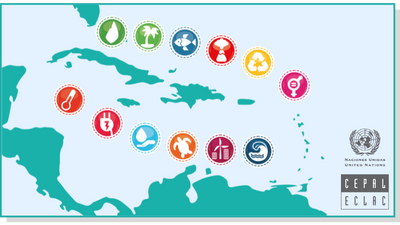Suriname: National workshop on generating climate change and disasters indicators for policy decision-making
Compared to other regions of the world, Latin America and the Caribbean has historically made a minor contribution to climate change. Nonetheless, the region is acutely vulnerable to its negative consequences. Suriname is no exception. It has already experienced extensive coastal erosion and has suffered damages from heavy rainfall, flooding and higher temperatures during dry seasons and high winds.
So far, the global focus on measuring GHG emissions has not provided much support to better measure climate change occurrences, impacts (including damages and losses), and adaptation indicators, which remain the most relevant issues for the Caribbean. The United Nation’s Development Account 12 project “Caribbean relevant climate change and disasters indicators for evidence-based sustainable development policies” aims to strengthen resilience to climate change and disasters by enhancing the production and use of selected, relevant, and prioritized indicators.
Over the past two decades, Suriname has worked hard to provide quality environment statistics and indicators. Suriname´s efforts in creating a solid national system to provide quality information on the status of the environment materialized with the promulgation of the Environment Act. The Act enables the National Environment Authority (NMA) to designate government agencies to provide information relevant for protecting the environment.
Despite having the mechanisms in place to access environmental data, the complexity of climate change and disasters statistics and indicators poses several challenges in Suriname to produce the necessary indicators to guide decision making. There is a need to build indicators on each of the critical areas to fight climate change, such as drivers, impacts, vulnerability, mitigation, and adaptation. Further, training on metadata and data collection for climate change and disasters indicators are required for various national stakeholders.
Objectives
- Train the participants to build selected environment, climate change and disaster indicators and its metadata.
- Identify data and capacity gaps to build an information platform on resilience for the country (statistics and geospatial data).
- Have a better understanding of how geospatial data can enhance the use of environment, climate change and disaster indicators for effective decision making.
Expected outcomes
- At least five prioritized climate change or disasters indicator and its metadata is available at the end of the workshop.
- A list of relevant and prioritized climate change and disasters indicators for Suriname that are also linked to the Paris Agreement and the Global Framework on Climate Change Indicators and Statistics of the UNSD.
- A work plan to build selected prioritized climate change and disasters indicators and statistics is agreed with GBS and key stakeholders.
13 Jul 2021
-
Inaugural session and introduction to the workshop
10:00 a 10:30» Moderator: Alda Díaz, Statistics Division of ECLAC
Opening remarks
▪ Rolando Ocampo, Director, Statistics Division of ECLAC
▪ Reena Shah, Chief, Environment Statistics Section, UNSD
▪ Kevin Sears, Senior Officer, CARICOM Secretariat
▪ Iwan A. Sno, Director, General Bureau of Statistics of Suriname- Karina Cázarez and Sofía del Villar, ECLACPresentations of the participantsKarina Cázarez, ECLACIntroduction and objectives of the workshop
-
1. Climate change and disasters indicators for Suriname: Needs and priorities
10:30 a 11:00- Donovan Bogor, National Institute for Environment and Development in Suriname (NIMOS)National policies and plans where climate change and disaster statistics and indicators are requiredReena Shah, UNSDGlobal Set of Climate Change Statistics and Indicators: a tool to identify multi-purpose indicators on climate changeKevin Sears, CARICOMClimate Changes Statistics and Indicators in the CaribbeanDavid Barrio, Sustainable Development and Human Settlements Division of ECLACThe Escazú Agreement: supporting environmental data for evidence-based public policies
-
2. What is needed to produce climate change and disaster statistics and indicators?
11:05 a 12:00- Xuan Che, UNSDFramework for the Development of Environment Statistics (FDES)Alberto Malmierca, ECLACData, statistics, and indicators: concepts and production of environment, climate change and disasters statisticsAlberto Malmierca, ECLACRelevant statistical classifications and typologiesFrancisco Jiménez, ECLACThe geospatial dimension of environment, climate change and disaster statistics and indicatorsAnjali De Abreu- Kisoensingh, GBSTypes of data sources used in Suriname: strengths and weaknesses» Questions and Answers SessionKarina Cázarez, ECLACChoosing the indicator for exercises of next day



